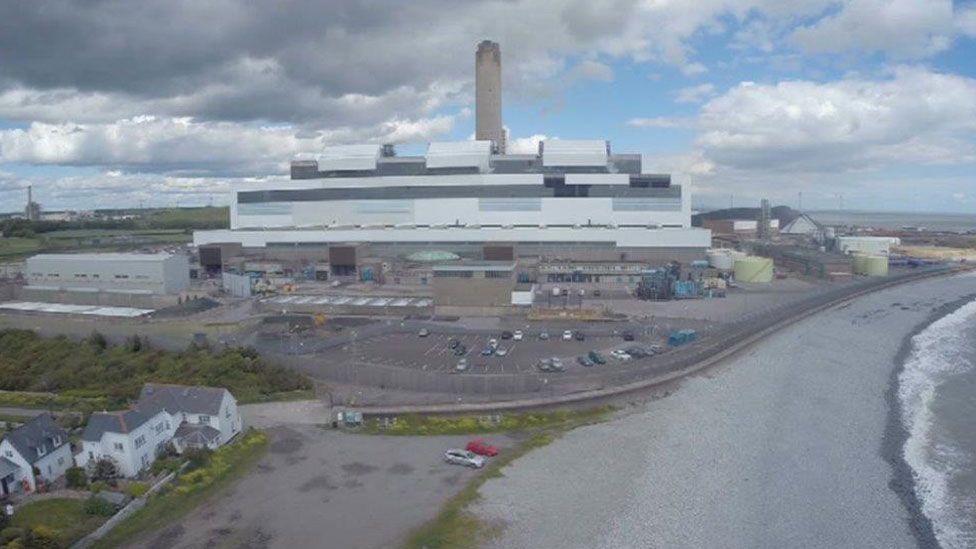Aberthaw power station pollution 'too high', EU court rules
- Published

The UK government has failed to limit pollution emissions from Aberthaw power station in south Wales, the European Court of Justice has ruled.
The coal-fired station in the Vale of Glamorgan was accused of pumping out more than double the legal amount of toxic nitrogen oxides for seven years.
RWE Generation said it was "disappointed" but that environmental protection was of the utmost priority.
The UK government claimed the power station was not in breach of the rules.
But the court disagreed and the UK government must pay court costs.
The station is already due to be downgraded from 2017 due to market conditions.
Aberthaw has been specifically designed to burn the low-volatile coal which comes from opencast mines in Wales.
Welsh coal is harder to burn than coal from elsewhere and Aberthaw's boilers have been permitted to produce higher emissions of nitrogen oxides than other UK plants.
But this was challenged by the European Commission and the case went to court 18 months ago.
ABERTHAW: FACTFILE
- Aberthaw 'B' opened in 1971 at a cost of more than £50m, alongside the older, smaller Aberthaw A power station.
- It employs 600 people
- It can generate around 1555MW of electricity for the National Grid, enough to provide power for 1.5m people
- Its coal is brought by rail - mostly from opencast mines in south and west Wales. But that is set to change with the need for new technology with fewer emissions.
- The company said in April it would abandon its current production model to focus on generating electricity at the plant only when needed from 2017. It would mean job losses but details have not been finalised.
The company said it "remains fully compliant" with all permits to control emissions.
RWE Generation added: "We will work with the UK and Welsh governments and Natural Resources Wales (NRW) to accommodate the changes to the way the station is regulated as a result of the EU ruling which will enforce an alternative interpretation of the legislation.
"The investment planned for the station is unaffected by this ruling."
Councillor Adam Riley would like to see certainty over Aberthaw's future
But Richard Little of Aberthaw Power Station warned that compliance with the ruling "under continuing difficult market conditions for coal generation, will have a wider cost".
He added: "It is with regret that it will mean our ability to use large amounts of Welsh coal is reduced somewhat earlier than might otherwise have been necessary.
"Despite this we believe that with plant efficiencies, modifications, and changes to our operating regime, the station can continue to support security of supply into the 2020s."
Analysis by Brian Meechan, BBC Wales business correspondent
This is a dispute putting jobs and the economy on one hand against health and the environment on the other.
Aberthaw has installed new technology that it says has substantially reduced nitrogen oxide emissions.
Major changes are planned for next April and its future remains uncertain.
It was designed to use coal from opencast mines in Wales, which is more difficult to burn.
Moving away from that type of coal and cutting down production will have an impact on suppliers including Tower Colliery.
The European Court of Justice took the UK to court as the member state but the responsibility ultimately rests with the Welsh Government.
A spokeswoman said the Welsh Government remained committed to improving air quality across Wales, adding: "Aberthaw operates in accordance with a strict permit administered by Natural Resources Wales which is designed to reduce the impact of the site on both people and the environment.
"The operator's investment in Aberthaw has already reduced its emissions and further investments are being made to deliver additional reductions over the remaining life of the station during the transition to lower carbon energy generation."
The European Commission said it was not asking for the closure of the plant, but for the reduction of polluting emissions to an acceptable level "that is in the interest of the citizens and of the environment".
Friends of the Earth Cymru and Greenpeace earlier this week called for "a full and permanent closure" due to claims emissions are impacting upon health.
A report from the two environmental bodies earlier this week claimed 400 premature deaths a year in the UK were likely to be due to nitrogen oxide exposure from Aberthaw.
They said it was an equivalent of 67 attributable deaths annually in Wales - about two thirds of the number who die on roads in Wales each year.
The report said the most severe impact of the pollution was felt locally across the south Wales coast but also in towns and cities including Exeter, Swindon and Bournemouth.
- Published30 June 2016
- Published16 October 2014
- Published25 April 2016
- Published26 March 2015